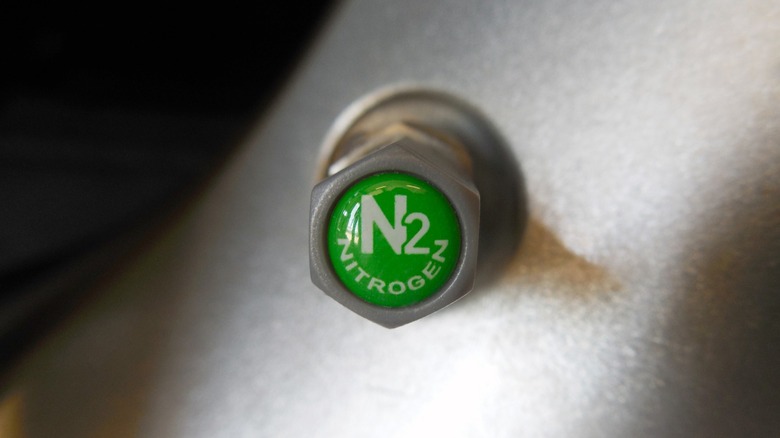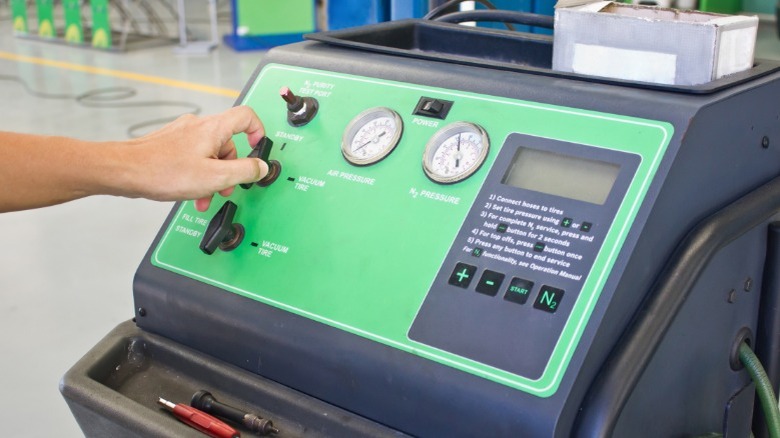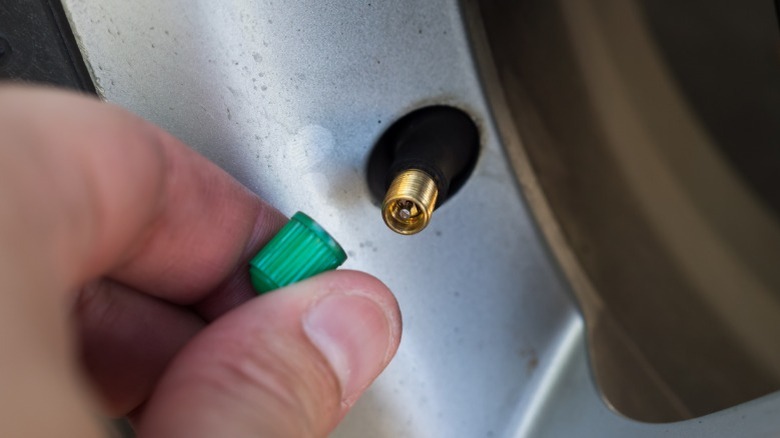Is It Safe To Add Regular Air To Nitrogen Tires? Here's What You Should Know
If you've ever noticed green-capped stems on tires in a parking lot and wondered why the car's owner chose them, you're not alone. It's a popular question, and one many people answer incorrectly. Green-valve-stem caps aren't a fashion choice — they signify that the tire contains nitrogen instead of regular air. There are benefits to this, but it's not always easy to find a place to get nitrogen refills — and it costs more. If your car comes with nitrogen-filled tires, you may be wondering if it's safe to fill them with regular air.
The answer is yes, it's completely safe to fill nitrogen tires with regular air. There's no physical difference between tires filled with nitrogen and those containing normal air. They're the same product, just filled with two different gases. So if you have regular tires and want to use nitrogen, you can.
You'll need to visit an auto repair shop or tire shop equipped with nitrogen, though, and you'll probably have to pay for a technician to drain the existing air from your tires and refill them with nitrogen. Depending on location, this can cost anywhere from $70 to $175. Then you'll have to continue paying a small fee for periodic refills.
Compared to regular air, which many shops provide for free, nitrogen can be an unnecessary, burdensome expense. If you're wondering why some people do it and whether it's worth it, stick around. As a former professional mechanic and lifelong car nerd, I'll explain it all.
Why do some tires use nitrogen?
The answer boils down to a little bit of science. The molecules that form the regular air we breathe are pretty small, even for molecules. Nitrogen molecules, meanwhile, are slightly larger. You may be thinking that the size difference between air and nitrogen molecules can't make that much of a difference, and you're right. However, it does make a very small difference when it comes to your tires.
Automotive tires are made from rubber — extremely durable rubber, yes, but rubber nonetheless. And rubber is naturally porous. So over time, your tires will lose a small amount of air. That air loss is relatively minimal, usually around one to two pounds per square inch a month. However, during extreme temperature fluctuations, like the beginning or end of winter, your car's tire pressure can change faster.
Because nitrogen molecules are larger, it's harder for them to slip through the pores in your tires. Some people choose to use nitrogen for this reason, as, in theory, you'll lose less pressure over time. That said, the difference is largely negligible, and nitrogen-filled tires lose, on average, about 1.3 pounds per square inch less during the entire year.
Besides losing slightly less pressure over time, nitrogen is also drier than air. Because it contains less moisture, using nitrogen may help prolong the life of your tire-pressure monitoring system's sensors and prevent the buildup of corrosion on your wheels.
Is filling your tires with nitrogen worth it?
As mentioned, there are minor benefits to filling your tires with nitrogen. First, your tires may be able to maintain a steady pressure for longer. That may seem unimportant, but consistent tire pressure can contribute to smooth handling and increased fuel economy, and it can even help extend your tires' life. Considering the high cost of new tires and fuel, those are important factors. However, remember that the difference in pressure loss between regular air and nitrogen is extremely small. Also remember that filling your tires with nitrogen almost always costs more than normal air.
Next, nitrogen can, in theory, help prevent the build up of corrosion on your tire-pressure sensors and wheels. However, those differences are also pretty minimal, and, in most cases, old age will kill your sensors' batteries long before corrosion can. Nitrogen isn't essential to protect your tires — in fact, abstaining from terrible driving habits is one of the best ways to extend your tires' life, and it's a lot cheaper than investing in nitrogen.
At the end of the day, whether you use nitrogen in your tires is a personal choice. It's not going to change your life or result in any radical driving improvements. But if the small benefits covered above are worth the extra money and time you'll spend to fill your tires with nitrogen, then you can definitely do it — and don't worry, you can always switch back to regular air at any time.


